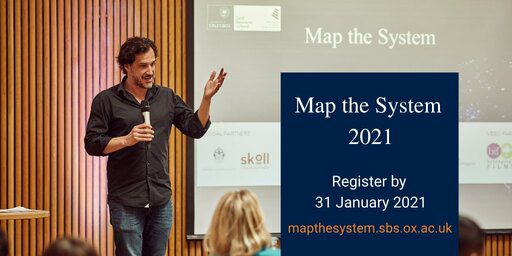Application Deadline: January 31st 2021
Map the System is a global competition of the Skoll Centre for Social Entrepreneurship, delivered in partnership with educational institutions around the world. From its inception in 2015, Map the System was designed to change the conversation in social impact education — moving from an overemphasis on the ‘heropreneur’ and new ‘solutions’ (typically in the form of a new proposed program or social venture) — toward a focus on deep understanding of complex problems as the foundation for driving transformational change.
The competition challenges participants to use systems thinking as a guiding approach to understanding some of the most complex issues the world faces today. Participants will delve deep into a social or environmental issue that matters to them and will take the time to explore, probe and research all its connecting elements and factors — later sharing their findings in a way that people can meaningfully understand, share, and learn from.
It is not a pitch competition, but rather a discovery process for participants of any discipline who have an interest in social and environmental change. It is designed to foster a systems thinking mindset among participants and encourages a learning first approach to social change — one where people take the time to understand and build upon existing efforts before attempting something new.
Requirements
Map the System is designed for students and recent graduates of any discipline who have an interest in social or environmental issues and who want to learn more about a problem they care about and present their findings to the world. It is ideally suited to those who meet at least one of the following:
- Those who have an existing passion for or lived experience of a particular social/environmental challenge and would like to investigate this problem fully to understand what sort of intervention in the system would be most effective.
- Those that are looking to have a high-impact career and want to understand where their unique skill set can be best applied to effect lasting change.
- Those who have an existing solution, product or business idea in mind, but would like to research the issue area thoroughly to understand what solutions have already been tried, and are willing to pivot their idea based on their findings.
How does it work?
- Each year, universities and post-secondary institutions from around the world partner with the Skoll Centre for Social Entrepreneurship at the Saïd Business School, University of Oxford to bring the Map the System to their students for a local edition of the competition.
- With dedicated support from the Skoll Centre team, educators (faculty or staff) from partner institutions lead the organisation of Map the System on their campus for a localised edition. Institutions can choose to offer the competition to students either campus-wide or department specific and can also choose to incorporate Map the System into their for-credit curriculum or run it as an extracurricular programme.
- Affiliated students and recent graduates from all disciplines and levels can register to take part individually or as part of a team of up to 5 members and spend the next several months diving deep into a social or environmental topic they are passionate about.
- Participants learn and utilise the principles of systems thinking as a guiding approach to understanding a complex social or environmental challenge and create visual systems maps as a means to articulate their findings in a way that people can meaningfully understand, share, and learn from – key skillsets for those interested in creating systemic and sustainable social or environmental change.
- One team of finalists from each partner institution is selected to present their findings at the Global Final event in June.
Submission Format
Participants are expected to take a system thinking approach to their research analysis and present their findings in three ways, that require three sets of storytelling skills: visual, written, and verbal.
The submission components include:
- A visual systems map
- A written summary of research findings (max 3,000 words) and detailed bibliography
- A 10-minute verbal presentation followed by Q&A from judges. (for teams that are selected to present at a local final or advance to the Global Final)
For More Information:
Visit the Official Webpage of the Map the System Global Competition 2021

